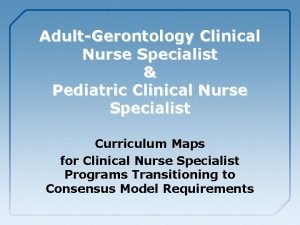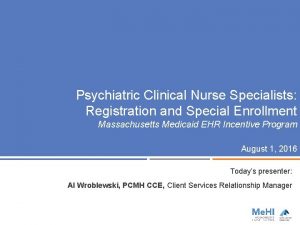1 Who We Are CLINICAL NURSE SPECIALISTS CNS















- Slides: 15

1

Who We Are CLINICAL NURSE SPECIALISTS (CNS) • Clinical Nurse Specialists (CNS) are licensed registered nurses who have graduate preparation (Master’s or Doctorate) in nursing as a Clinical Nurse Specialist. • APRN’s 2

CNS • Clinical Nurse Specialists are expert clinicians in a specialized area of nursing practice. The specialty may be identified in terms of a: – Population (e. g. pediatrics, geriatrics, women’s health) – Setting (e. g. critical care, emergency room) – Disease or Medical Subspecialty (e. g. diabetes, oncology) – Type of Care (e. g. psychiatric, rehabilitation) – Type of Problem (e. g. pain, wounds, mental health) 3

Who We Are (continued) • Clinical Nurse Specialists practice in a wide variety of health care settings. • In addition to providing direct patient care, Clinical Nurse Specialists influence care outcomes by providing expert consultation for nursing staffs and by implementing improvements in health care delivery systems. 4

Who We Are (continued) • Clinical Nurse Specialists are eligible to prescribe in 37 states. If a Clinical Nurse Specialist elects to use their prescriptive authority, they may prescribe durable medical equipment and/or pharmaceuticals. 5

• Clinical Nurse Specialist practice integrates nursing practice focusing on: • • assisting patients in the prevention or resolution of illness • diagnosis and treatment of disease, injury and disability 6

Who We Are (continued) • CNS practice is conceptualized across three spheres in which the CNS exerts influence: – Patient/Client Sphere (Individual, Family, Community) – Staff Sphere (Nurses, Nursing Practice) – Organization/System Sphere • Expert nursing practice in the patient/client sphere provides the underpinnings for CNS practice. 7


CNS Subroles • • Expert clinician Educator Consultant Researcher Role model Collaborator Mentor

• Change Agent – Research – EBP • • • Development of: Programs Policies Protocols Procedures 10

Selected Outcomes of CNS Practice • Reduced Medical Complications in Hospitalized Patients • Reduced Hospital Costs and Length of Stay • Improved Pain Management Practices • Increased Patient Satisfaction with Nursing Care • Increase Professional Development of Nurses • Reduced Frequency of Emergency Room Visits 11

CNS Statistics • An estimated 59, 242 RNs have the education and credentials to practice as a clinical nurse specialist (CNS). • Approximately 16, 363 are prepared as both a nurse practitioner and a CNS. (HRSA, 2008 National Sample Survey of RNs) • Depending upon the region of the country and clinical specialty, CNS salaries range from $65, 000 to over $110, 000 annually. 12

Strategic Goals • Increase national visibility and influence of CNSs. • Promote the growth and development of NACNS. • Provide a national forum for CNSs to exchange information, share resources and discuss current issues. • Maintain NACNS as the national authority for CNS practice, education, and research. • Demonstrate the linkage of CNS practice to safe, high quality, evidence-based cost effective health care. 13

• NACNS: Role • ANCC: Credentialing • OBN: Scope of Practice 14

MISSION: To enhance and promote the unique, high value contribution of the clinical nurse specialist to the health and well-being of individuals, families, groups and communities, and to promote and advance the practice of nursing. 15
 Antigentest åre
Antigentest åre A nurse preceptor is orienting
A nurse preceptor is orienting Sponge nurse role
Sponge nurse role Pediatric clinical nurse specialist programs
Pediatric clinical nurse specialist programs Clinical nurse specialist ontario
Clinical nurse specialist ontario Sisco routers
Sisco routers Calvin klein swot analysis
Calvin klein swot analysis The number of merchandise categories a retailer offers
The number of merchandise categories a retailer offers Psyc 1504 learning journal unit 1
Psyc 1504 learning journal unit 1 Tegral agri sheeting
Tegral agri sheeting How to become a lawn care specialist
How to become a lawn care specialist Global experience specialists stock
Global experience specialists stock Surgerync com
Surgerync com Concrete hydrodemolition specialists
Concrete hydrodemolition specialists Cns
Cns Cns depressants ppt
Cns depressants ppt




























